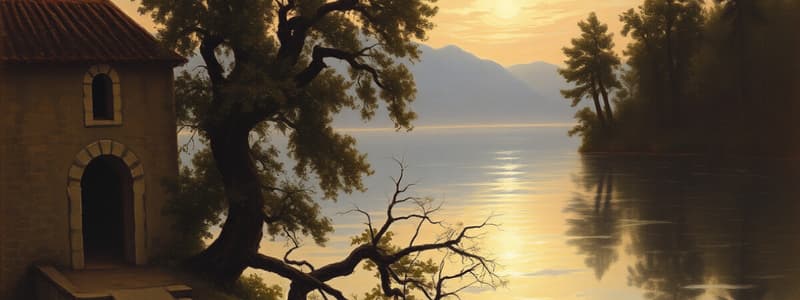Podcast
Questions and Answers
Which intellectual movement emphasized human potential and achievement through the study of classical texts?
Which intellectual movement emphasized human potential and achievement through the study of classical texts?
- Baroque Aesthetics
- Romanticism
- Medieval Scholasticism
- Renaissance Humanism (correct)
What was one of the main outcomes of scholars studying classical manuscripts during the Renaissance?
What was one of the main outcomes of scholars studying classical manuscripts during the Renaissance?
- Emergence of humanism (correct)
- Development of scientific methods
- Introduction of modern philosophy
- Creation of religious texts
Classical texts were often made to align with which of the following during the medieval period?
Classical texts were often made to align with which of the following during the medieval period?
- Christian beliefs (correct)
- Roman law
- Pagan traditions
- Mystical philosophies
What was the primary focus of scholars in relation to classical studies during the Renaissance?
What was the primary focus of scholars in relation to classical studies during the Renaissance?
Which of the following was NOT a characteristic of scholarly activities during the Renaissance?
Which of the following was NOT a characteristic of scholarly activities during the Renaissance?
What can be inferred about the approach of humanists towards life during the Middle Ages?
What can be inferred about the approach of humanists towards life during the Middle Ages?
Which aspect of life did humanists emphasize during the Middle Ages?
Which aspect of life did humanists emphasize during the Middle Ages?
What was the general sentiment towards material pleasures among devout Catholics during the Middle Ages?
What was the general sentiment towards material pleasures among devout Catholics during the Middle Ages?
What does the phrase 'enjoy life without indulging' imply about the humanist perspective?
What does the phrase 'enjoy life without indulging' imply about the humanist perspective?
What was a significant characteristic of food consumption among certain humanists in Italy during the Middle Ages?
What was a significant characteristic of food consumption among certain humanists in Italy during the Middle Ages?
Study Notes
Literature and Philosophy in the Middle Ages
- Humanists emphasized simplicity in living, promoting plain foods and simple clothing over material luxuries.
- Despite this, some enjoyed worldly pleasures, reflecting a tension between spiritual devotion and human enjoyment.
Influence of the Medici and Classical Ideas
- The Medici family played a critical role in the cultural development of the Renaissance by supporting scholars and artists.
- A revival of classical manuscripts led to the rise of humanism, highlighting the potential of human achievements.
- Intellectual movements saw a shift towards valuing individual potential and engaging with classical texts in connection with Christian teachings.
Democratic Movements Post-Soviet Union
- In 1989, Poland witnessed its first free elections, indicating a move towards democratic governance after decades of dictatorship.
- The early 1990s saw the breakup of the Soviet Union, resulting in the emergence of 15 new republics with a focus on national identity.
- Significant reforms occurred in Hungary, aiming for democratization after years under Communist rule.
End of Apartheid
- South Africa transitioned to a democratic government after overcoming decades of racial segregation known as apartheid.
- East Timor gained independence from Indonesia in 2002 through a UN referendum, reversing nearly 30 years of occupation.
Renaissance Patronage and the Ideal Renaissance Man
- Wealthy families supported arts by commissioning portraits and donating to public art, showcasing their societal importance.
- The concept of the "Renaissance Man" emerged, describing individuals skilled in multiple disciplines, reflecting the period's values.
- Baldassare Castiglione's book, "The Courtier," outlines the traits of an ideal gentleman, emphasizing poetry, music, and athletics.
The Role of Renaissance Women
- Renaissance women were educated but typically not expected to pursue fame; they played supportive roles in inspiring art rather than creating it.
- A notable figure, Isabella d'Este, managed political responsibilities effectively and supported the arts, showcasing the rare political influence of women during the Renaissance.
- The educational advancements for upper-class women were significant compared to medieval times, although their political influence remained limited.
Studying That Suits You
Use AI to generate personalized quizzes and flashcards to suit your learning preferences.
Related Documents
Description
This quiz explores the themes and contributions of literature and philosophy during the Middle Ages. Participants will examine key texts and the demonstration of piety by philosophers of the time, gaining insight into the cultural and intellectual landscape of the era.




